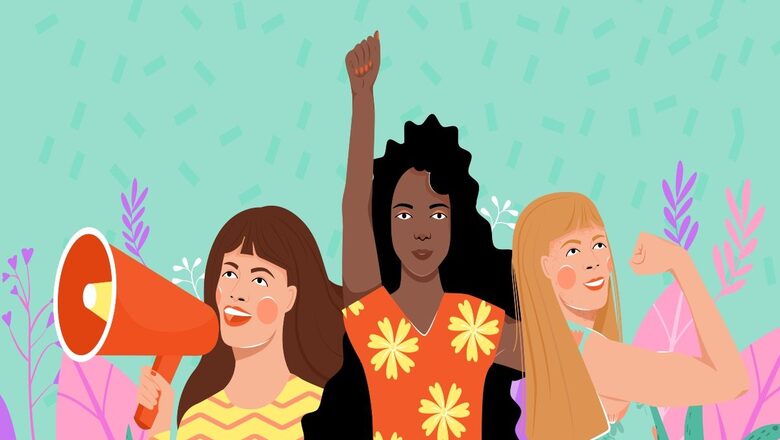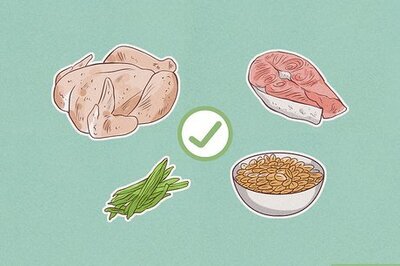
views
The sudden descent of social media brought with it the awkward combination of identity and anonymity. It gave us millennials a chance to voice our opinion, a poorly met need in the average Indian household. Teenage to adulthood was like a crash course on adaptation. My tryst with feminism was in this background. Soon enough, my struggles found language in something so beyond me but yet so personal. My innermost experiences found home and expression. Finding language, and learning of the many women who fought the good fight before you was like a river finding the sea. The changes in the innermost chambers could be best described as rapid. Awkwardly held between wanting to be the glowing bride in a large family that sang together and ate together to seeing how much it took away from women – life had in so many ways started throwing this or that situations. I zipped through it all – ways in which I couldn’t feel the years go by, but so vividly some days that marked milestones.
Soon enough, one thing became crystal clear – as a woman, I had an empowerment tax to pay in being who I wanted to be.
My mother and I are probably ten generations apart in the price we would pay to be appreciated by society, its norms and its structures, let alone to be accepted as their own. The tragedy of this change is everything else, everybody has changed less rapidly, and less radically. Now, we have an entire universe of empowered women ready for the world.
The question is where are the others? A gaping gap. For most women, standing up to patriarchy comes at a very personal, intimate cost. It has hurt where it hurts the most – at home, with those we love and those who love us. For those who are pushing the envelope, we are negotiable on tables that are the hardest to leave.
So many women are operating at a frequency unmatched by men, communities, workplaces and probably the rest of the universe. Now, this is not an attempt at whining at the cost that one has to pay, it probably is the cost of change, but to reflect deeply on the loneliness of leading that change. Loneliness in the innermost chambers and more so for women who have supposedly over-achieved.
A recent study by Dr Kowalewska, a lecturer in social policy at the University of Bath, renews our attention to the role that societal norms and expectations play in shaping men’s attitudes towards employment.
The study analysed data from over 42,000 individuals across nine countries and found that men in relationships, where the woman is the sole breadwinner, have lower well-being than those in relationships where the man is the primary earner or both partners work. In fact, she states, “Having a partner who is also not employed makes men feel less bad about their own joblessness and less self-conscious.” This reflects the societal pressure on men to fulfil traditional gender roles and maintain their masculinity. Clearly, it reveals the need for women who are achievers to constantly tiptoe around their partners and peers to keep a feel-good environment. Constant playing down is mutually exhausting and damaging.
Families are disproportionately penalised when women assume the role of primary earner. This is particularly pertinent given that female breadwinning is often not a transitory arrangement. In my view, it is essential to strive for equity and impartiality in all facets of society, including within familial and interpersonal relationships.
At the core of the issue is patriarchy itself, which perpetuates the notion that men are the primary breadwinners and women’s earnings and more so work is secondary. This is reflected in the wage gap between men and women, which is even more pronounced in some countries compared to the West. Mainstream feminist scholars have proposed the dual-earner model, where both men and women earn, as a gender-egalitarian solution. However, as a study by Dr Kowalewska suggests, even in dual-earner households, women breadwinners tend to receive fewer family benefits than men and are often forced to make deliberate choices in adverse economic circumstances.
The stigma and gender division that exists within this generation is deeply ingrained and difficult to undo. Across the globe, there is a coherence in the struggles faced by women employees, many of which are undefined, unacknowledged, and unpaid. I was rewatching Gulzar’s masterpiece film ‘Aandhi’, made in 1975, broadly described then as “the story of a great woman political leader in post-Independence India”.
‘Aandhi’s’ narrative transcends mere simplicity, delving into intricate depths. Its discerning conclusion delicately recognises that domesticity might never fully accommodate a woman’s aspirations, thereby earnestly exploring the profound impact of patriarchal norms on tender relationships. The film compellingly depicts the dilemma faced by women torn between pursuit and pressure. A day in 2023 and not much feels very different.
As we crescendo in our chorus to challenge patriarchy, we must acknowledge the empowerment tax that women are paying every day to be those women. We must deeply reflect on the burden and constant consciousness it takes to tip-toe around our success. We must reduce the everydayness of the burden of being that woman – allowing women to choose vulnerability and strength together, to co-exist, like they naturally do. The ability to be this and that and mostly, the ability to just be.
The author is UN Women Mission Head for Timor-Leste. Views expressed in the above piece are personal and solely that of the author. They do not necessarily reflect News18’s views.




















Comments
0 comment